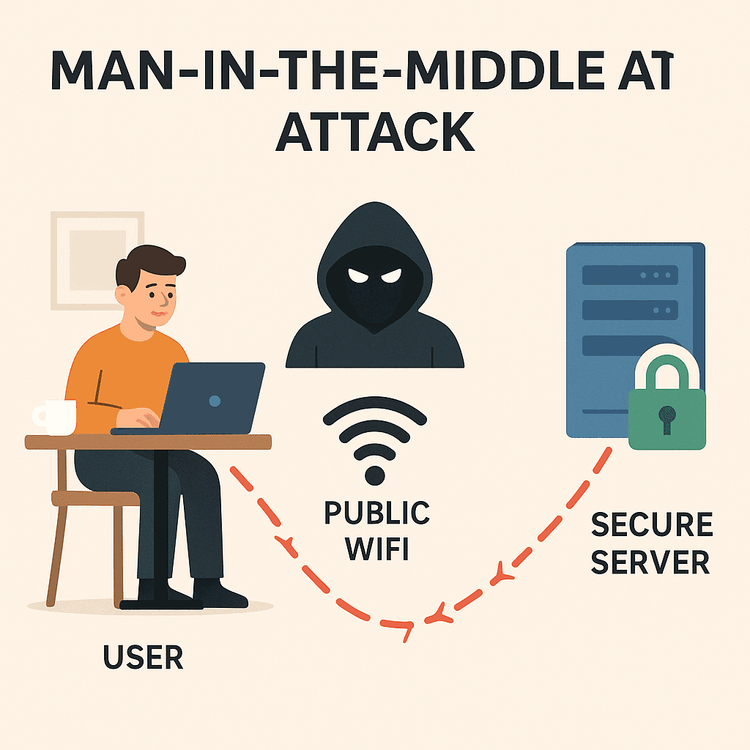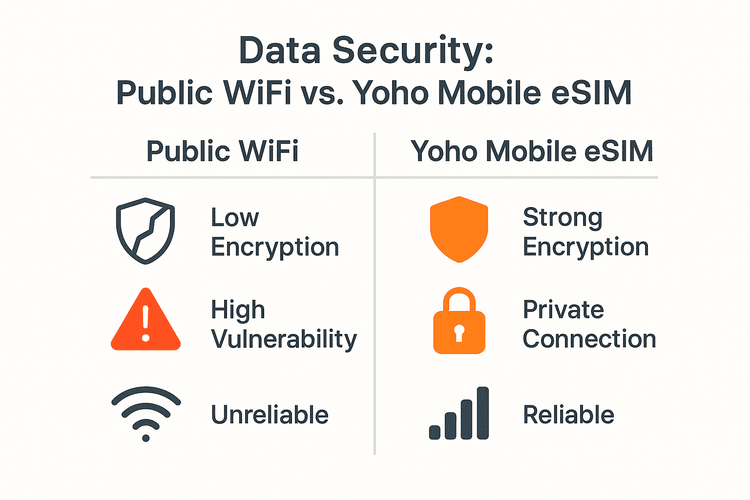Imagine this: you’ve just landed in Lisbon, found a charming café, and you’re about to log in for a crucial client meeting. The free public WiFi beckons. But is convenience worth risking your sensitive company data or personal information? For digital nomads and remote workers, this is a daily dilemma. The connection you choose can be the difference between a productive workday and a cybersecurity nightmare.
This guide breaks down the security battle: public WiFi vs. your own private cellular data via an eSIM. We’ll explore the hidden risks of that ‘free’ connection and show why a modern connectivity solution is the only real choice for secure work and travel.
Don’t wait for a security breach to take action. Explore Yoho Mobile’s secure, flexible eSIM plans today.
The Alluring Trap: Understanding the Dangers of Public WiFi
Free WiFi in airports, cafes, and hotels is incredibly convenient, but it’s an open playground for cybercriminals. These networks often lack robust security, making you an easy target. According to the FBI’s Internet Crime Complaint Center (IC3), public Wi-Fi is a common vector for attacks. The most significant risks of using public WiFi abroad include:
- Man-in-the-Middle (MitM) Attacks: Hackers position themselves between your device and the connection point. They can intercept, read, and even alter your data—including passwords and financial details—without you ever knowing.
- Unencrypted Networks: Much of the data sent over open WiFi isn’t encrypted. This means your login credentials, financial details, and private messages can be easily snatched by anyone with basic hacking tools on the same network.
- Malware Distribution: Cybercriminals can use unsecured WiFi connections to inject malware onto your device when you access a non-secure website or download a file.
- Evil Twin Hotspots: Attackers create fake WiFi hotspots with legitimate-sounding names (e.g., “Airport_Free_WiFi_Official”). Once you connect, they have full access to your traffic, capturing every piece of data you send.

The Secure Alternative: How an eSIM Creates Your Digital Fortress
So, is an eSIM secure? Absolutely. An eSIM (embedded SIM) connects you directly to a cellular network, just like a traditional SIM card, but without the physical plastic. This method of connection is fundamentally safer for data security while traveling for several key reasons:
- Inherent Cellular Encryption: All data transmitted over modern cellular networks (4G/LTE, 5G) is heavily encrypted by default. This is a standard set by global telecommunication bodies like the GSMA, making it extremely difficult for unauthorized parties to intercept.
- Bypassing Local Threats: With an eSIM, your data travels directly from your device to the carrier’s secure network. You completely bypass the vulnerable local router that is the weak point in any public WiFi setup.
- Private, Dedicated Connection: You aren’t sharing your network with strangers in a café. Your eSIM provides a personal data channel, eliminating the risk of snooping from other users on the same network.
Head-to-Head: Public WiFi vs. eSIM for Remote Work Security
When your livelihood depends on secure data, the choice becomes clear. A direct comparison of public WiFi vs. cellular data security shows a stark contrast in protection levels for any digital nomad.

The comparison highlights that eSIMs vastly outperform public WiFi in every security-related aspect. From robust, built-in encryption to protection against common cyberattacks, cellular data via eSIM is the professional standard for data security while traveling.
Yoho Mobile: More Than Just Security for the Modern Nomad
While robust digital nomad cybersecurity is non-negotiable, an eSIM from Yoho Mobile offers even more practical advantages. Imagine landing in Tokyo and being online before the plane even reaches the gate—no more hunting for a local SIM card vendor.
Our flexible plans allow you to build the perfect data package for your trip, combining countries, data amounts, and duration. Heading on a multi-country tour of Southeast Asia? Create a custom eSIM plan for Thailand and Vietnam and pay only for what you need.
And what about running out of data mid-project? With Yoho Care, you’re never truly offline. Even if your main data package is depleted, we provide a backup connection to ensure you can send that last-minute email or message for help. It’s the ultimate peace of mind for any traveler. Learn more about the safety net of Yoho Care.
Pro-Tips for Maximum Data Security While Traveling
Using a secure eSIM is the biggest step you can take, but you can enhance your defenses even further with these cybersecurity tips for digital nomads:
- Use a Reputable VPN: Even on a secure cellular connection, a Virtual Private Network (VPN) adds another layer of encryption and masks your IP address, providing maximum privacy.
- Keep Devices Updated: Always install the latest software updates for your OS and apps. These often contain critical security patches.
- Enable Two-Factor Authentication (2FA): Secure your important accounts with 2FA wherever possible. An excellent guide on this is available from the U.S. Federal Trade Commission.
- Ensure Your Phone is Compatible: Most modern smartphones support eSIM technology, but it’s always wise to double-check. You can see a full list on our eSIM compatible devices page.
- Be Wary of Phishing: Be mindful of phishing scams and fake login pages, a threat that cybersecurity experts at WIRED consistently warn about.
Frequently Asked Questions (FAQ)
Is an eSIM more secure than hotel WiFi for business?
Yes, significantly. Hotel WiFi is a form of public WiFi and carries all the same risks, including potential snooping by other guests or malicious actors. An eSIM uses an encrypted, private cellular connection, making it the far superior choice for handling sensitive business data.
Can my data be hacked if I use an eSIM?
While no technology is 100% immune to all threats, hacking data transmitted over an eSIM is extremely difficult due to the strong, built-in encryption of 4G and 5G cellular networks. It is vastly more secure than any public WiFi network.
Do I still need a VPN if I’m using a secure eSIM?
While an eSIM connection is already encrypted, using a VPN provides an additional layer of security and privacy. It encrypts your data again and hides your IP address, which is best practice for anyone handling highly confidential information or wanting maximum anonymity online.
What’s the best way to protect my data while working remotely in cafes?
The single best way is to avoid public WiFi entirely. Use a personal hotspot powered by your Yoho Mobile eSIM. This creates your own secure bubble, protecting you from all the vulnerabilities of the cafe’s shared network.
Conclusion
In the debate of public WiFi vs. cellular data security, there’s a clear winner for the discerning digital nomad: the eSIM. While the convenience of free WiFi is tempting, the associated risks to your data and privacy are simply too high in 2025. An eSIM provides a robust, encrypted, and private connection that empowers you to work from anywhere with confidence.
Ready to upgrade your travel security and stay effortlessly connected?
Try Yoho Mobile with a risk-free trial eSIM and experience the freedom of secure, global connectivity.
